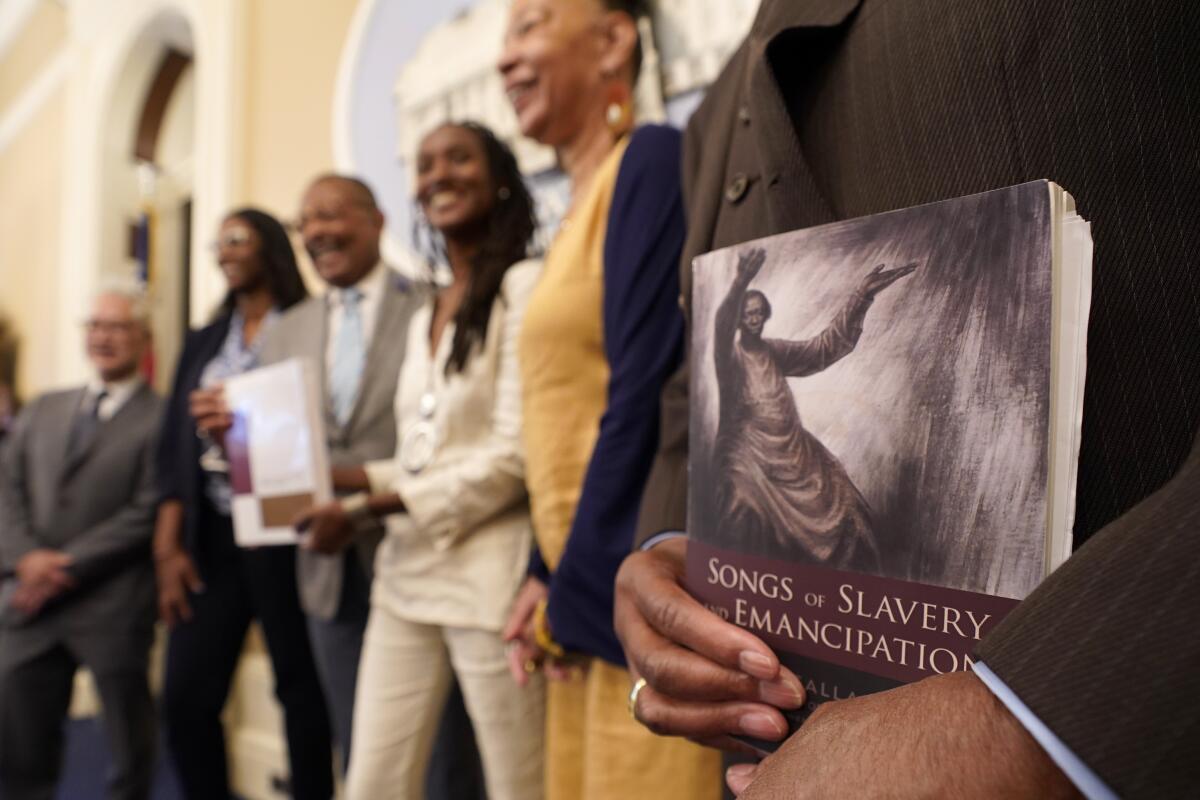Letters to the Editor: Black people have been vilified in the media. No wonder cash reparations are unpopular

- Share via
To the editor: As African Americans, we are not surprised that a significant majority of non-Black Californians oppose the idea of the state offering cash payments to the descendants of enslaved Black people.
Public opinion does not form in a vacuum. For decades the media have besmirched the image of African Americans, often depicting us as violent criminals, welfare queens and parasites. In contrast, the requests of other groups who were not subject to widespread media vilification have been more favorably received.
For example, large numbers of Americans endorsed cash payments to Japanese citizens who were incarcerated in prison camps during World War II. The same can be said of financial redress granted to Native Americans.
Let us be clear: 246 years of free labor from millions of Black people anchored this nation’s early development and ultimately catapulted America into becoming a modern superpower. In a capitalist system, cash is the best way to provide restitution to the formerly enslaved, and the media should report this fact to set the record straight on America’s unique indebtedness to Black people.
Patricia A. Moore, Compton
The writer is national chair for reparations at the National Assn. for Equal Justice in America.
..
To the editor: The headline surely led most readers to believe that cash payments to descendants of enslaved people are the primary focus of the recommendations proposed by the California Reparations Task Force.
In mentioning other recommendations, the article chose those that would likely be hot-button issues for those who oppose reparations.
Focusing on ending the death penalty, paying fair market value for jail and prison labor, and restoring voting rights to all formerly and currently incarcerated people treats as secondary the long-ranging recommendations that are intended to address the after-effects of slavery and racial discrimination. The massive disparities have affected Black people in every walk of life.
Touching on recommendations that will have an impact on eliminating these disparities would have given readers a more balanced view of what the task force is attempting to accomplish.
Denise Flanagan, Riverside
..
To the editor: Slavery was abolished in the U.S. in 1865. If a single generation is 25 years, more than six have passed since then.
The Great Famine in Ireland, which killed about 1 million people, took place during roughly the same period (1840s-50s). The famine was a direct cause of the overlording British taking Ireland’s crops for their own consumption.
With generations having passed since then, it has never occurred to me to seek reparations from the British due to their mistreatment of my ancestors.
If Gov. Gavin Newsom has aspirations for a continued political career, he had better dump this idea immediately. Not only is paying cash reparations a bad idea, the right-wing media will make sure it sticks to him like Hillary Clinton’s emails did to her.
Dan O’Connell, Santa Clarita
..
To the editor: It’s not surprising to see resistance to cash reparations because the ground has not been prepared for our nation to accept responsibility for the consequences of chattel slavery.
To understand why, look only to the unwillingness to educate our young about the oppression of Black people because some feel non-Black children might feel bad.
This ought to be the fundamental message: Our tradition of justice requires that people suffering damages be made whole.
I suggest three areas for remediation: enhancements in the health, wealth and educational opportunities of traditional Black communities. These might take the form of greatly improved free schools and medical facilities, preferential small business and mortgage programs, and the means to pass on generational wealth.
Some may suggest other forms of remediation. But first, a persistent campaign must persuade the majority that justice is long overdue.
Philip Baer, North Hollywood






